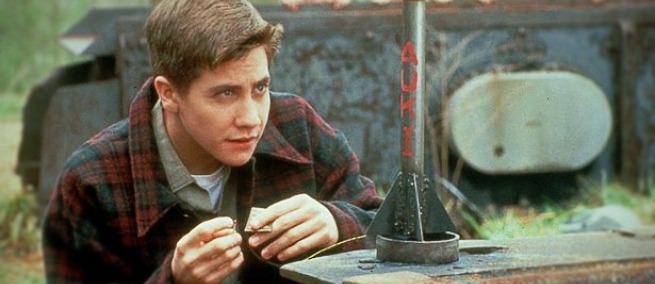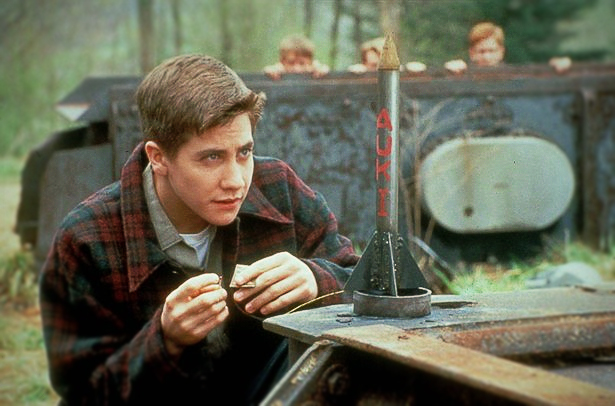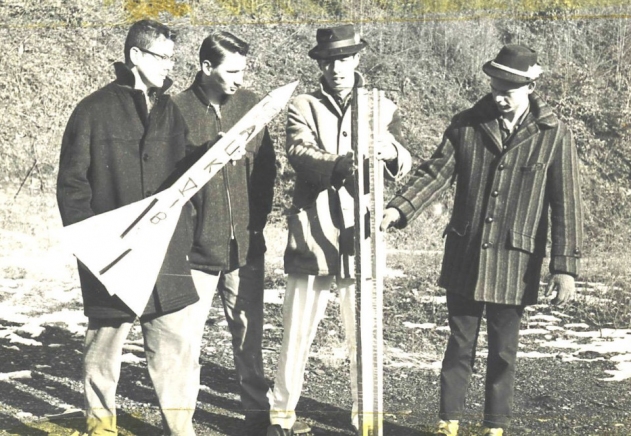
The beep heard round the world of the Soviet-launched Sputnik in orbit propels four teenagers to build a rocket through trial and error to escape a life confined to their small mining town. This is the plot of the 1999 movie OCTOBER SKY directed by Joe Johnston. Jake Gyllenhaal stars as the ambitious student and Laura Dern as the teacher who believes in him. The film is based on a book by Homer Hickam, a legendary aeronautical engineer and trainer of NASA astronauts whom Gyllenhaal plays in the film.
Dr. Patrick Simpkins is Director of Engineering for NASA and the Kennedy Space Center. Simpkins’ father worked at NASA and he grew up watching rockets launch. Science & Film spoke with Dr. Simpkins, who was on a cell phone outside his office overlooking the launch pad, about the film.
Science & Film: In OCTOBER SKY the main characters are teaching themselves the necessary science to build a rocket. How realistic do you think that depiction is in the film?
Patrick Simpkins: I think the mixing of the propellant would be really tough for a kid to do nowadays, though that was probably very accurate for the time. Essentially, what they were doing was they were making their own rocket engines whereas today, kids would pretty much be able to go to a hobby store and buy the engine they wanted.
S&F: How did you get interested in NASA?
PS: My dad, straight out of college in the ‘60s, went to work for NASA. He worked at the Langley Research Center in Virginia for a little bit but didn’t like the fact that he wasn’t close to the actual rockets, so he moved us down to Florida. I lived within viewing distance of every rocket program at the Space Center. There is a scene in the movie where they blow up rocket after rocket when they are trying to learn. My dad used to call the house and say, there’s a rocket taking off, and we would go out in the front yard and watch the rocket. When I was a little kid, if the rocket blew up it was kind of cool. I found out a little bit later that was not a good thing. I was very interested in space, but as a little kid I knew it was a dangerous, risky endeavor, and there was a lot of science and math required to make it safe. When I went to college I wanted to get an engineering degree but I didn’t want to work at NASA just because my dad worked there. I got an environmental engineering degree and I saw an advertisement for an environmental systems and life support job. I applied and I ended up getting hired; I was actually interviewed under the space shuttle. At the time, I was working at a fast food restaurant and the guy asked, would you be interested in coming in and working for NASA? I thought for a millisecond, no I’d rather keep that fast food job, but I ended up coming out here and it just turned out that I worked on environmental systems on the space shuttle itself. So I worked in waste management, but it was going seventeen and a half thousand miles per hour in zero gravity.
S&F: This film is one way for kids to get inspired, wouldn’t you say?
PS: If you are anywhere near, or can get anywhere near, a launch activity or a mission control activity at the Johnson Space Center or Marshall, or watch one on television, you will be hooked. All it takes is one.

S&F: What are some of the key traits, important courses, or abilities someone who wants to work at NASA needs?
PS: Dava Newman, our Deputy Administrator, talks a lot about STEAMD—she wants to include arts and design in science, technology, engineering, and math. We need people from all walks of life to contribute. Speaking from my personal perspective, exposure to the sciences is key. I didn’t excel in college in engineering but I got enough technical on me, so to speak, that if I wanted to use more of the right side of my brain I could do that and I could make the connection with the technical information. I understood enough to synthesize. When I am talking to high school or college students, I emphasize that they need to do well in the basics. Just because you can’t see an application of calculus today doesn’t mean that it’s not important in whatever your endeavor is. Math is the language of the really smart folks that are designing, developing, and building this stuff. It is necessary but it is not sufficient.
I always talk to people about getting involved in multi-disciplinary projects. I always comment that whatever you do, please make collaborative activity a requirement. I think in all walks of life that learning in a collaborative mode early is so important. That gives you the opportunity to see outside your swim lane. If you’re a mechanical engineering major and you are on a senior project that requires a software code and programmable logic, that may be your only exposure to electric engineering before you get into the workplace. By participating in that project, even though your swim lane is mechanical engineering, you know who is in the lane next to you.
S&F: I saw the IMAX film A BEAUTIFUL PLANET filmed by NASA astronauts. Seeing how these astronauts were living in such a small space working together, I can imagine what you’re talking about. Have you ever participated in a film project?
PS: No, though there have been a number of them that have filmed out here. Most of them are fiction but some are historical fiction like APOLLO 13.
S&F: How likely is it that we will reach Mars?
PS: I am a firm believer. I think we are headed as an earthbound species toward expanding that presence to Mars first if not the Moon first; I think we are destined. If it is not us it could be private industry, it could be China, it could be a collaborative effort between us and Russia and maybe eventually China. It’s just a question of when and the political and financial will to do it sooner rather than later.
S&F: You’re talking about actually colonizing another planet?
PS: Absolutely. I think it is so far away that we are going to work hard to live off the land, which is very much like THE MARTIAN. The core ingredients required for him to survive on Mars were kind of in place. If we take some of those same technologies a little bit further, which we’re in the process of doing, I just see people going there and maybe after a few years it starts to make sense just to stay. If the infrastructure is developed to send somebody there temporarily it doesn’t take much more. Initially we’ll always be planning on returning but the reality is, it’s a multi-year mission just to go at the right time and come back at the right time.
When I was in elementary school somebody from NASA came to talk to us about the Apollo program and he talked about the Shuttle. He said, it is designed for 10 years, but in designing it to last 10 years, it will actually be capable of flying many more times and much longer because we have designed it with safety and functionality in mind such that all it would require is refueling and cleaning and we could start it again. I think about that today. We’re designing something to be safe for a crew for three years; it’ll have the provision that it needs to have and we’ll always build in factors of safety so if for some reason it can’t just be three years we’ll be in a position to handle that. If we send somebody to the surface of Mars with the intention of safely living and working and then coming home in a year and a half, we’re going to provision and design it for twice that. It stuck with me.

S&F: What do you think is the best or worst film representation of NASA?
PS: I think THE MARTIAN is right up there, followed closely by APOLLO 13. Both of them are about challenges and both of them are about what a collaborative group of people is capable of.
The screening of OCTOBER SKY is part of the Science On Screen Program, begun at the Coolidge Corner Theatre and expanded with a grant from the Sloan Foundation to cinemas nationwide. The program pairs film screening with introductions by scientists, engineers, or mathematicians. Science & Film has previously interviewed a computer scientist about COMPUTER CHESS, one of the most famous paleontologists in the world about JURASSIC WORLD, and an addiction specialist on TRAINSPOTTING.
PARTNERS
TOPICS